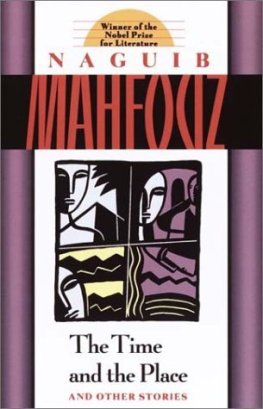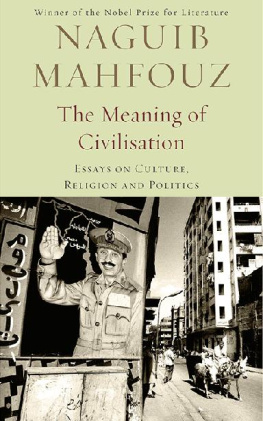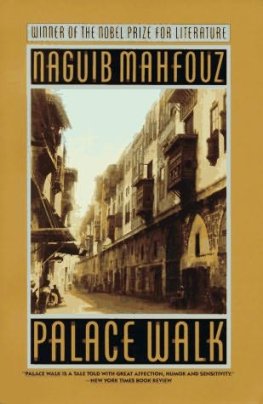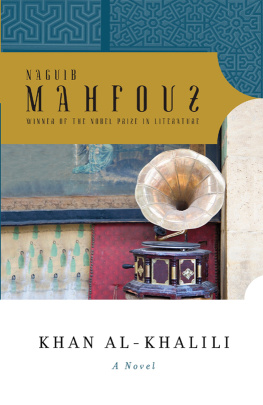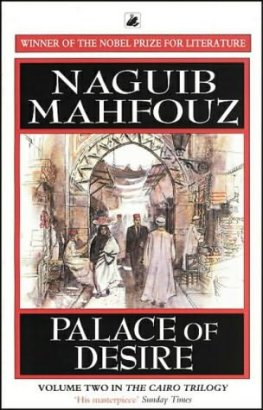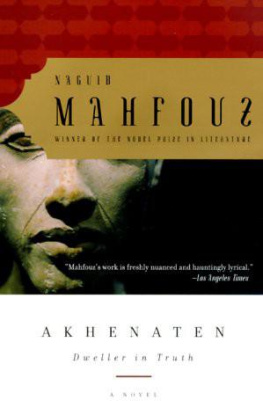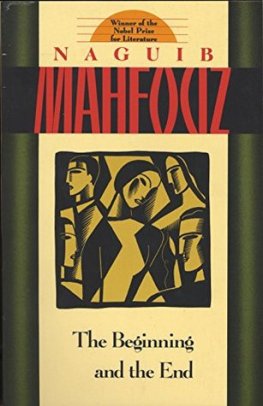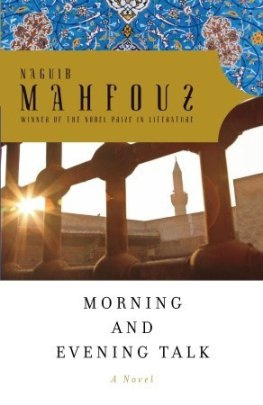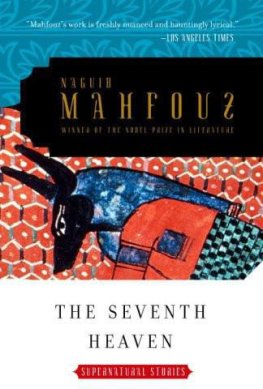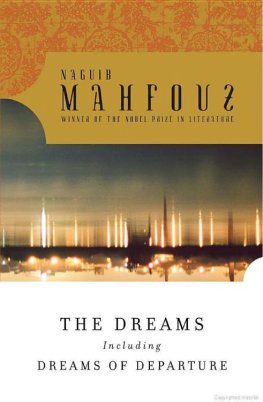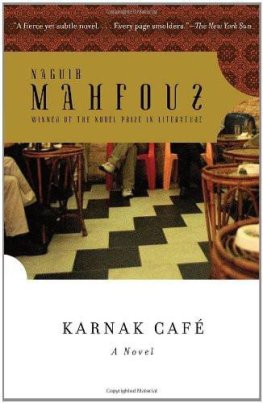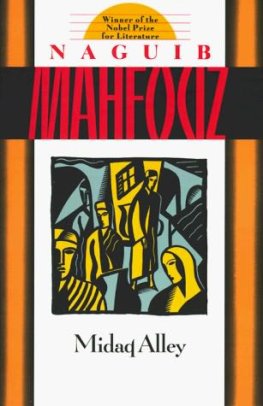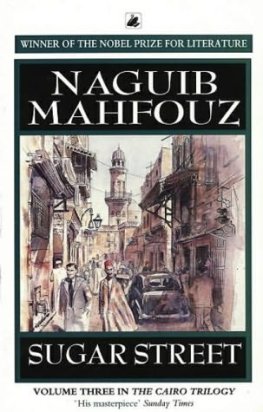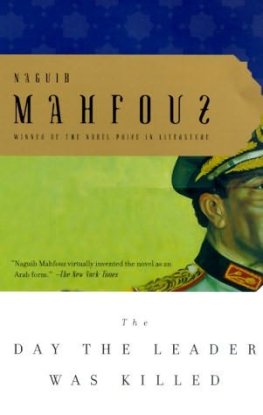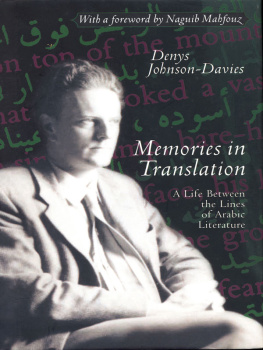Naguib Mahfouz
The Time and the Place: And Other Stories
It is of course as a novelist that Naguib Mahfouz is best known. His output in that field, nearly forty books, is by any standard formidable and inevitably overshadows his accomplishments as a writer of short stories. And yet his fourteen volumes of short stories contain some of the best in modern Arabic literature and it is the short story which, in the Arab world, has been the preferred genre since the first attempts at writing fiction in Arabic were made early in this century. (Let us ignore here the fact that one of the worlds greatest masterpieces of fiction, A Thousand and One Nights, was composed in Arabic.) Short stories by Naguib Mahfouz have appeared in translation in many languages, and it is interesting to find, in a collection such as The Art of the Tale (Penguin, 1986), alongside the work of such authors as Borges, Beckett, Camus, Greene, and Marquez, a single example from the Arab world a story by Naguib Mahfouz, and this before he had been awarded the Nobel Prize. The story chosen is The Conjurer Made Off with the Dish, which had previously been published in a collection of stories by Egyptian writers and is included in the present volume. Of the remaining nineteen stories in this volume, all but three are appearing in English for the first time.
Naguib Mahfouz is essentially an Egyptian writer. Born in 1911 in Gamaliyya, one of Cairos most picturesque districts, he has spent his life in that city and moves from it only once a year, to spend the hot summer months in seaside Alexandria. Only twice in his life has he been abroad, and after his second trip he vowed never to travel again. His writings, almost without exception, are placed in Cairo; in the present collection only A Day for Saying Goodbye has another setting Alexandria. Like their author, his stories never travel abroad, not even to the Egyptian countryside with its peasant life, which has been such fertile soil for most Egyptian writers. A predominance of his novels and stories are sited in that square mile or so which makes up the districts of Gamaliyya and al-Hussein, an area which includes that vast bazaar known to tourists as Khan al-Khalili, with its numerous mosques, cafs, small shops, and jostling motley of colorful characters.
Stories like Fear and The Wasteland take place in the dark narrow alleyways of bustling activity where fitiwwattoughs, the bosses of small gangs contend for control of some area of a quarter and exploit it to their advantage. (Today the fitiwwat, like the gangsters of the days of Prohibition, are a thing of the past.) Both these early stories also show Naguib Mahfouzs preoccupation with time he has cited Proust as one of his main literary influences. In The Wasteland the protagonists single-minded efforts are rendered meaningless by his failure to take account of the fact that, for others as much as for himself, time accompanies people on their journey through life. In Fear, too, by the end of the story time has stolen the bloom of youth from Naimas cheeks and has given the dashing young police officer a paunch. The Empty Caf tells of the loneliness of old age: a long life, as the old man says, is a curse. It is as though he no longer belongs to the human race, having outstripped all his contemporaries, and ends by hoping to find companionship in another species, the cat belonging to his young, over-rambunctious grandson. A Long-Term Plan reminds us that nothing in life is right unless its timing is right, no good luck so futile as when it comes at the wrong time. Most moving of all the stories concerned with time is the short Half a Day, where time is telescoped into the mornings walk, the first day at school, and the return journey home. It is a gentle story tinged with nostalgia for time irrecoverable.
In the West, as religion becomes increasingly a social function or merely part of the cultural background, many people like to think that, helped by such institutions as insurance companies, they are masters of their fate. The East, particularly the Islamic East, knows better. The Koran tells the Muslim that a persons life span lies in Gods hands, emphasizing that every soul must taste death. Not surprisingly, death plays a leading role in the lives of the characters that people Naguib Mahfouzs writings.
The period from 1967 to 1971, following Egypts disastrous 1967 war with Israel, was a bad one for Mahfouz. During those dark years he gave up writing novels and turned to the short story. In many of the stories he wrote during this time among his best and blackest death is central. Referring to these stories, he has remarked that he could never conquer the idea of dying until he wrote about it. Stories like At the Bus Stop are as bleakly pessimistic as anything he has written. A Fugitive from Justice contains a very short scene, quite extraneous to the events of the story, in which the funeral procession of a young girl prompts one of the protagonists to observe: Isnt it the road we all take? Such reminders crop up often in Mahfouzs stories.
In The Man and the Other Man, the world is described as being subject to many laws, not just one and several of the stories in this volume inhabit that gray area that lies behind the faade of comfortable reality. Zaabalawi, for instance, introduces us to a world of uncertainty, frustration, and contradiction, a world inspired by Sufism, Islams particular brand of mysticism, in whose rich literature Naguib Mahfouz is deeply read. In The Time and the Place, the author, with great deftness, creates a Thousand-and-One-Nights atmosphere and prepares his reader for and makes credible happenings that can only be explained in terms of some super-natural law. All this he does with a remarkable economy of words. This ability to be brief and explicit Mahfouz ascribes to the many film scenarios he has written during his career.
Modern Arabic literature as a whole contains little humor, though the Egyptians especially are noted for their wit and their habit of making fun of their circumstances and, in particular, of their leaders. Some of this dry humor is to be found in The Norwegian Rat, as well as in The Ditch, which deals with the economic tribulations of middle-class Egyptians living in a society crippled by inflation and suffering such an acute housing shortage that many have in desperation taken up residence in the family mausoleums in the City of the Dead.
The slight and somewhat uncharacteristic story The Answer Is No is Naguib Mahfouzs most recent. At the time he was awarded the Nobel Prize, an Egyptian weekly asked him for any recent story that was as yet unpublished, and he sent them this one. What is remarkable about it is that, written by a man of his generation, it should be so outspokenly feminist. For the Western reader it provides an insight into how different Eastern societies are in respect of sexual mores, even a country as modern-minded as Egypt. A Western reader might well ask, Whats all the fuss about? Naguib Mahfouz, as an Egyptian, knows what the fuss is about but makes it clear where his own sympathies lie.
It was in 1934, the year in which he graduated in philosophy from Cairo University, that Mahfouz saw published his first piece of original writing a short story. At that time, he would send his stories to magazines and be delighted if they appeared in print. He recounts how one day an editor asked him to call round at his office. He did so and was handed a pound for his latest story. One gets paid for them as well! exclaimed the budding writer in disbelief and it was with the same modest disbelief that, more than half a century later, he received the news of the Nobel Prize.
DENYS JOHNSON-DAVIES
Finally I became convinced that I had to find Sheikh Zaabalawi.

